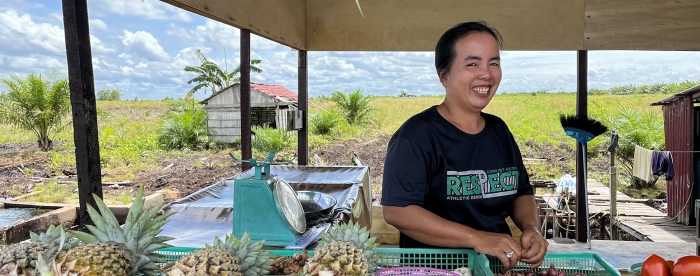News
Our stories ... ...

the Netherlands - 05 July, 2023
Through the Green Finance for SMEs (GFS) programme, Tropenbos International aims to bridge the gap between international finance and local entrepreneurs with ideas for sustainable businesses. In 2022, the programme broadened its strategy by including buyers and exporters in the value chains of forestry and agroforestry products.
Small and medium-sized enterprises (SMEs) in the forestry and agroforestry sectors have the potential to generate sustainable economic activities that benefit local communities while also contributing to biodiversity and building climate resilience. However, only a small portion of international biodiversity and climate funding is allocated for this group. Moreover, SMEs often struggle to access financial capital to invest in sustainable businesses.
In 2021, to facilitate finance flows for SMEs that contribute to thriving and climate-resilient landscapes, TBI started a three-year programme, Green Finance for SMEs (GFS), with support from the Dutch Postcode Lottery. The programme aims to strengthen SMEs’ capacity to develop bankable business proposals, while simultaneously creating awareness among financial institutions and funders of the need to develop financial instruments to reach SMEs, and to spur action on their part. The programme also set up a GFS facility, which provides guarantees to local and international financial service providers to decrease their risks when investing in SMEs in the agroforestry and forestry sectors.
In 2022, the programme took some important steps. At the landscape level, Tropenbos members in Colombia, Ghana, Indonesia, and Suriname helped local SMEs to develop nine feasible business cases. Simultaneously, the programme broadened its strategy by including established buyers and exporters within the value chains of key forestry and agroforestry products. The GFS facility can help buyers and exporters with accessing finance to invest in sustainable and responsible production by smallholders and community organizations. Through targeting such private players, the programme’s impact will increase. It will also provide an example for other conservation and development organizations, who are often hesitant to move beyond direct support for smallholders and communities.
One significant opportunity was identified in Ghana. Cocoa farmers who switch to organic agroforestry practices can earn significant premiums from the European market, while also benefitting from a range of other products cultivated in their cocoa fields, such as cassava, banana and ginger. Tropenbos Ghana started collaborating with a local buyer and exporter of organic cocoa, with whom they signed a memorandum of understanding to invest in smallholders’ organic practices for a more climate-resilient landscape. The local exporter then started applying for a trade finance facility from an international fund to buy organic cocoa at premium prices from approximately 1,800 organic cocoa smallholders, using the GFS guarantee as a de-risking tool. Similar opportunities have been identified in Asia and Latin America, to be implemented in 2023.
In November 2022, staff from the TBI secretariat in the Netherlands and Tropenbos Ghana gave a presentation on the GFS programme to international impact investors, fund managers and development banks at the European Microfinance week of the European Microfinance Platform, in Luxembourg. They also established connections with important players, such as the Rabo Foundation, who are interested in collaboration. Together with other stakeholders, TBI will continue to develop its innovative approach to bridging the gap between international finance and local actors’ sustainable practices.